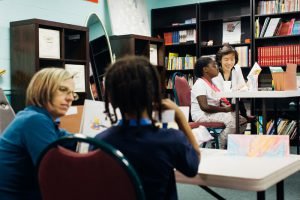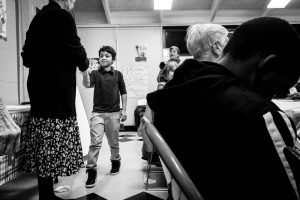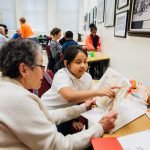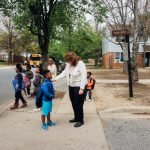+ By Theresa C. Sanchez + Photos by Allison Zaucha
 Have you ever been so excited that you actually jumped for joy? Linda Barbour, Executive Director of Start Adventures in Reading Initiative (STAIR), did just that upon learning that Anne Arundel County Public Schools Superintendent George Arlotto was making second-grade reading comprehension a priority.
Have you ever been so excited that you actually jumped for joy? Linda Barbour, Executive Director of Start Adventures in Reading Initiative (STAIR), did just that upon learning that Anne Arundel County Public Schools Superintendent George Arlotto was making second-grade reading comprehension a priority.
“I am just delighted. Up until two years ago, I didn’t feel there was enough emphasis on early education, especially reading,” says Barbour, a self-described kid at heart who still owns most of her childhood books. “I want STAIR to be put out of business. Now, I don’t think that’s going to happen, because there will always be children who come from homes where the parents, for one reason or another, don’t have the time or ability to read to their kids.”
STAIR, a 501(c)(3) nonprofit organization, has been tutoring and mentoring at-risk youth in the greater Annapolis area since it launched at the Stanton Center in January 2006, with 12 tutors and nine students. Today, the program boasts 150 tutors who instruct 80 pupils at nine sites in eight of the county’s public schools. Each institution involved with the program saw marked gains in reading proficiency at or above grade levels for the 2015–2016 school year. The program serves a diverse student population: 46% African American, 41% Hispanic, 12% Caucasian, and 1% Native American.
 Barbour tracks students’ progress using Fountas and Pinnell scores provided by their teachers. Data gleaned from the nationally recognized guided reading system helps tutors and faculty better address children’s individualized study needs. Such a tailored approach sets everyone up for success in a consistent and relaxed environment. Barbour stresses the importance of experiential quality over competition, and is optimistically cautious when discussing grades. “I truly believe that we help, but we don’t make that score escalate all by ourselves. We spend two hours a week with the children, but teachers are working day after day with the kids.”
Barbour tracks students’ progress using Fountas and Pinnell scores provided by their teachers. Data gleaned from the nationally recognized guided reading system helps tutors and faculty better address children’s individualized study needs. Such a tailored approach sets everyone up for success in a consistent and relaxed environment. Barbour stresses the importance of experiential quality over competition, and is optimistically cautious when discussing grades. “I truly believe that we help, but we don’t make that score escalate all by ourselves. We spend two hours a week with the children, but teachers are working day after day with the kids.”
“For a lot of these children, having an adult who will give them their complete attention for two hours a week is a rare and very positive experience,” says Germantown Elementary Site Coordinator Leslie Gradet. “There is more than just reading taking place; life lessons are also learned.” The retired lawyer underwent the mandatory two-hour training before becoming a STAIR volunteer four years ago. She praises the transformative powers of tutelage: “You could work with a student who may not seem to be making a whole lot of progress, but then, one day something will take, and they’ll start liking to read. That’s powerful.”
For decades, policy and advisory groups have backed such testimonials with research. The National Education Association affirms that practice, repetition, and persistence are crucial to beginning readers. A three-year longitudinal study of reading development, headed by psychiatrist, neurophysiologist, and developmental cognitive neuroscientist Fumiko Hoeft at the University of California, San Francisco, determined that there is an indisputable link between the amount of white matter—the brain’s language recognition highway—in the temporoparietal region and the ability to read written material. Apparently, this narrows down the critical production time for white matter to the time between kindergarten and third grade. Doctors at Cincinnati Children’s Hospital affirmed, through functional magnetic response imaging scans, that children who were read to had heightened activity in that aforementioned left side of the brain.
 These discoveries have helped adults better understand how to approach language and reading with students, but there are still challenges. Germantown Elementary School Principal Karen K. Soneira acknowledges that one of the biggest challenges with younger students is “applying letter-sound knowledge to decode unknown words.” This obstacle can seem more insurmountable for kids whose parents speak little to no English or are themselves illiterate. STAIR helps such students from falling by the wayside.
These discoveries have helped adults better understand how to approach language and reading with students, but there are still challenges. Germantown Elementary School Principal Karen K. Soneira acknowledges that one of the biggest challenges with younger students is “applying letter-sound knowledge to decode unknown words.” This obstacle can seem more insurmountable for kids whose parents speak little to no English or are themselves illiterate. STAIR helps such students from falling by the wayside.
“As students progress from learning to read, they then begin to read to learn. As students read to learn, the world becomes an open canvas into many topics of interest,” says Soneira.”The many caring adults that have been trained to support literacy, mentoring one-to-one on a regular basis to encourage young readers, is what makes STAIR an amazing program.”
Enthusiastic smiles and active engagement are evident upon entering any of the program’s locales. Each weekly two hour-long tutoring session commences with a snack and one-on-one interactive reading. In the best-case scenario, the remaining 45 to 50 minutes are sectioned off, as appropriate, into four study areas: tackling sight words, word study, vocabulary, and fluency development. If there’s time remaining, students play word-related games as a group. Reading outside the classroom is stressed, and the children are given books to take home.
“I’m 70 years old, and I’m still learning new words. You never stop learning new words and reading books,” says STAIR Assistant Director of Communications and Development, Ted Mussenden. “It’s not about the number of books read, it’s about how many you really understand and comprehend the meaning of. That, to me, is where the rubber hits the road.”
STAIR’s curriculum consists of 12 units. Students, on average, complete three to four units each mentoring term (October to May). Notwithstanding, the graduation requirements are yearlong attendance and commitment to the tasks.
 What happens when the schools close in June? Educators and parents have dubbed that three-month period—where learning leaks and lacks—“summer brain drain.” To combat it, last year STAIR established a weeklong Summer Reader’s Theater, and is preparing to do it again this July with a play a day, grouping children by grade and task. Much of the planning is still underway, but it is likely to be well attended.
What happens when the schools close in June? Educators and parents have dubbed that three-month period—where learning leaks and lacks—“summer brain drain.” To combat it, last year STAIR established a weeklong Summer Reader’s Theater, and is preparing to do it again this July with a play a day, grouping children by grade and task. Much of the planning is still underway, but it is likely to be well attended.
“[Less advantaged] children and their parents have to look to the local community centers, if there is one available, to give them an enriching learning experience over the course of vacation season,” says Barbour. “The children are our hope for the future. They are our gold. Everybody wins at STAIR.” █
For more information, visit
www.stairannapolis.org




















